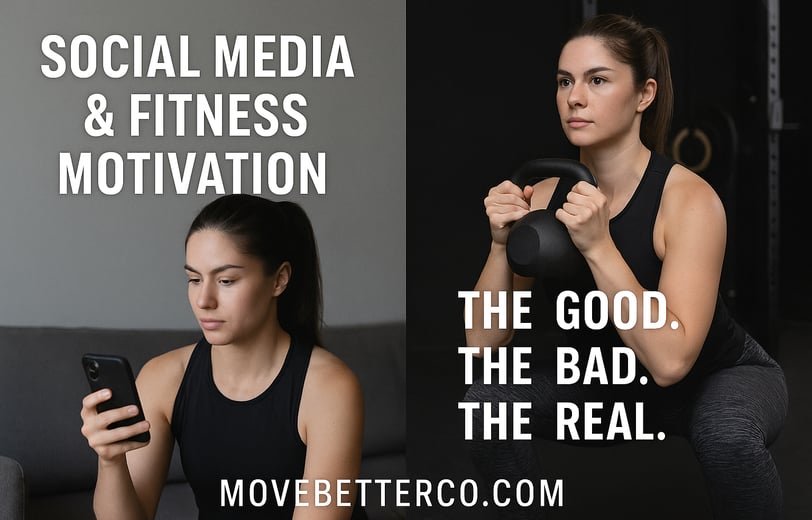How Social Media Affects Your Fitness Motivation (And What to Do About It)
Social media can either fuel your workouts or wreck your confidence. This article breaks down the real impact of fitness content online — with science, strategy, and how to take back control of your motivation.
6/1/20253 min read


The Impact of Social Media on Fitness Motivation
It’s no secret that social media has changed the game when it comes to fitness. Scroll through Instagram, TikTok, or YouTube and you’ll find a never-ending feed of workouts, before-and-after transformations, and motivational quotes. For some, it’s inspiring. For others, it’s overwhelming. And for most of us, it’s both.
Let’s break down how social media affects fitness motivation — the good, the bad, and how to make it work for you.
The Upside: When Social Media Fuels You
When used the right way, social media can be a huge motivator. You get access to thousands of workout ideas, tips, and real stories from people going through the same ups and downs. That sense of community? It’s real — and it’s powerful. Seeing others stay consistent can make you want to show up for yourself too.
One thing that helps? Tracking your progress. Instead of just posting for likes, keeping a written record of your workouts, meals, or goals makes it all feel more intentional. A simple fitness journal can keep you grounded, whether you’re sharing your journey online or just keeping it to yourself.
Studies back this up too — research from the Journal of Medical Internet Research found that fitness influencers who post relatable content (like progress struggles, realistic routines, etc.) actually help increase followers’ motivation to exercise. It’s the authenticity that sticks.
And if you’re someone who likes to film your workouts, document your form, or even create your own content, having a good tripod in your gym bag can make the process easier and more consistent without needing anyone to hold the phone.
The Downside: When It Starts Messing With Your Head
On the flip side, constantly seeing picture-perfect bodies and dramatic transformations can take a toll. It’s easy to start comparing yourself to people who might be further along, filtered up, or frankly, not being honest about their journey.
Too much comparison can lead to burnout, self-doubt, and even skipping workouts altogether. A lot of fitness pages emphasize aesthetics over health — pushing unrealistic goals that don’t reflect what long-term, sustainable fitness actually looks like.
Studies have shown that the more we compare ourselves on social media, the more likely we are to feel discouraged or dissatisfied with our own progress. That’s a problem — because fitness is supposed to make you feel stronger, not worse.
If that sounds familiar, it might help to shift the focus back to your own data. Tools like the Fitbit Charge 5 give you insight into your movement, sleep, heart rate, and more — stuff that actually matters for performance and recovery, not just what you see in the mirror.
How to Make Social Media Work for You
It’s not about quitting social altogether — it’s about using it on your terms. Here’s how to get the good without the bad:
Follow the right people: Look for creators who are real about the process — not just the end result.
Track your own wins: Whether it’s reps, mindset, or energy levels, your progress is your proof.
Post if it helps you: Sharing your journey can keep you accountable — just don’t feel like you have to.
Unplug when needed: It’s okay to take breaks. Your body and brain will thank you.
If you’re creating content or just like clean visuals for your own motivation, setting up your space right matters too. A decent ring light makes a difference if you’re shooting in your room or a dim garage gym — and yeah, it’s okay to want your setup to look good.
Music plays a role here too. If you’re someone who grinds harder with a soundtrack, a pair of Powerbeats Pro earbuds gives you solid sound, no wires, and they stay put even during sprints or lifts.
Final Take
Social media isn’t the enemy — but it can be if you let it control how you feel about your progress. If you’re using it as a tool for inspiration, connection, and accountability, it’s powerful. If it starts making you question your worth or feel like you’re not doing enough, it’s time to step back and recalibrate.
Track your progress for you, not for the algorithm. Build routines that support your energy, not just your image. And follow people who keep it real.
Your fitness journey should make you stronger — mentally and physically. Social media can help, but only if it stays in its place.
FITNESS
Nutrition
WellnesS
info@movebetterco.com
© 2025. All rights reserved | Privacy Policy | Terms & Conditions